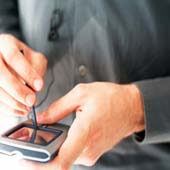 It’s difficult to imagine not loving a device that lets you e-mail, surf the Web, manage your schedule and make phone calls too. Some BlackBerry users have become so dependent on the devices that they are called “CrackBerries.” Marketed by Canadian firm Research in Motion (RIM), the BlackBerry has quickly become an indispensable work tool for many people, providing total mobility—along with a high dependency.
It’s difficult to imagine not loving a device that lets you e-mail, surf the Web, manage your schedule and make phone calls too. Some BlackBerry users have become so dependent on the devices that they are called “CrackBerries.” Marketed by Canadian firm Research in Motion (RIM), the BlackBerry has quickly become an indispensable work tool for many people, providing total mobility—along with a high dependency.
Techno addiction warning
Professor Nada Kakabadse of the U.K.’s Northampton University has published a study on how widespread techno addiction can be. “You would be surprised how many people had their PDA or BlackBerry next to their bed heads,” she says, adding that addicts even wake up several times a night to check their e-mail! And as with many addictions, it is difficult to detect until it’s too late.
In addition to the risk of addiction, the BlackBerry can also cause health problems—the dreaded “BlackBerry thumb,” for tendinitis and arthritis of the thumb that can affect heavy users.
Avoid becoming a CrackBerry
“The easiest thing is to switch off your cell phone at nights and on weekends,” saysMaria M. Fitzpatrick, Regional Executive Vice-President for the National Capital Region of the Public Service Alliance of Canada. “For employees to be productive at work, there has to be a balance between their work and family lives.“
Edward Hallowell, an American doctor and author of the book CrazyBusy, agrees. He has coined the word “screensucking,” which refers to the time wasted stuck in front of any screen. He advocates taking back control by switching off BlackBerries and cellular phones, something easier said than done for some people.
BlackBerries have even become a bargaining issue. In the spring, the Public Service Alliance of Canada asked for extra compensation for users, claiming that the expectation is that such employees be available 24/7.
As for BlackBerry thumb, a recent study carried out by StrategyOne for Microsoft on ergonomics and repetitive stress injuries recommends not sending overly long e-mails on mobile devices and frequently resting your thumbs.